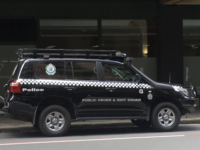The Law, Defences and Penalties for the Public Order Offence of Riot in NSW

Three people have now been charged over the aftermath of a stabbing of a Bishop at the Christ the Good Shepherd church in Wakeley in Sydney’s Western Suburbs.
The stabbing
A 16 year old who is reported to have been suffering from mental health conditions since he was five years old is said to have travelled up to one and a half hours to attend the Church on the afternoon of Monday, 15 April 2024 and stab Assyrian Orthodox preacher Bishop Mar Mari Emmanuel six times and also stab Father Isaac Royel.
The teenager was quickly apprehended by parishioners at the Church and was formally charged in hospital on Thursday, 18 April 2024 with the Commonwealth crime of committing a terrorist act, which is an offence under section 101.1 of the Criminal Code Act 1995 carrying a maximum penalty of life in prison.
To establish the offence, the prosecution will need to establish beyond a reasonable doubt that the youth:
- Engaged in or threatened an action,
- The action was done or threatened with the intention of advancing a political, religious or ideological cause, and
- The action was done or threatened with the intention of:
(a) Coercing, or influencing by intimidation, the government of the Commonwealth or a state, territory or foreign country, or part thereof, or
(b) Intimidating the public or a section thereof.
The aftermath
The attack prompted around two thousand people to descend on the Church, and subsequently turn on attending police.
According to a spokesperson from the New South Wales Police Service, 94 police vehicles were damaged and 26 officers were injured.
Three people have now been arrested and charged with the criminal offence of riot. One of the men is alleged to have yelled “he’s not leaving alive”, in reference of course to the young assailant.
Police foreshadow that up to 50 people who participated in the aftermath will face criminal offences.
The offence of riot in New South Wales
Riot is a public order offence contained in section 93B of the Crimes Act 1900 (NSW), which carries a maximum penalty of 15 years in prison.
To establish the offence, the prosecution must prove beyond reasonable doubt that:
- The defendant was one of twelve or more persons present together,
- The defendant used or threatened unlawful violence,
- The defendant intended to use violence or was aware his or her conduct was violent,
- The conduct of the group was for a common purpose, and
- The conduct of the group as a whole would cause a person of reasonable firmness who might be present at the scene to fear for his or her personal safety.
The section makes clear that:
- It is immaterial whether the unlawful violence was used or threatened at the same time as other members of the group,
- No person/s other than the group’s members need actually be present at the scene,
- The offence can occur in public as well as private places, and
- The ‘common purpose’ may be inferred from the conduct of the group as a whole.
Other public order offences
A more commonly charged public order offences is affray – which is an offence under section 93C of the Crimes Act 1900 that does not require the involvement of a minimum number of people and carries a maximum penalty of 10 years in prison.
The offence requires to prosecution to prove beyond reasonable doubt that:
- The defendant threatened unlawful violence towards another person, and
- The conduct would cause a reasonable person present at the scene to fear for their safety.
Another public order offence is known as violence disorder, which is an offence under section 11A of a generally less-serious piece of legislation known as the Summary Offences Act 1988.
This offence carries a maximum penalty of 6 months in prison and requires to prosecution to prove beyond reasonable doubt that:
- The defendant was one of three or more persons present together,
- The defendant threatened or used unlawful violence,
- The defendant intended to threaten or use unlawful violence, or was aware the conduct may amount to violence, and
- The conduct of the group taken as a whole would cause a person of reasonable firmness to fear for their personal safety.
Legal defences to public order offences
Legal defences to public order offences include self-defence, duress and necessity.
In the event the defendant is able to raise evidence of a legal defence, the onus then shifts to the prosecution to prove beyond a reasonable doubt that the defence does not apply in the circumstances.
The defendant is entitled to an acquittal – in other words, a not guilty verdict – if the prosecution is unable to discharge this onus.
Focus should be on mental health support, not tougher criminal laws
Five unrelated stabbings have occurred in Sydney over the past couple of weeks – the highest profile of which are the stabbing of Bishop Mar Mari Emmanuel and Father Isaac Royel, during which no one was killed, and the multiple stabbing at Westfield Shopping Centre in Bondi Junction which killed six people and injured 12, including a 9-month old baby.
These events have led to calls for tougher laws against knife crimes.
However, the statistics from In New South Wales, available from the Bureau of Crime Statistics and Research (BOCSAR) show that assaults and robberies where a knife was used as a weapon are at 20 year lows. It is also important to be aware that penalties for possessing a knife in a public place or at a school have recently been increased.
The real issue appears to be the focus on tough on crime laws at the expense of mental health support and rehabilitation services, and the diversion of potential offenders away from the criminal system.
In that regard, it is important to note that in both of the said stabbings, the perpetrators are said to have had long-standing mental health issues.
The alleged Bondi perpetrator, 40-year-old Joel Cauchi, who was shot by a NSW police officer at the scene, had battled with serious mental health issues for more than 20 years, according to his parents.
And as stated, the 16 year old who has been charged over the Wakeley stabbing has struggled with mental health since he was a five years old.
It is hoped governments will shift their focus so as to decrease the likelihood of similar tragedies occurring in the future.
Going to court for a public order offence?
If you have been charged with a public order offence such as riot, affray or public disorder, call Sydney Criminal Lawyers 24/7 to arrange a free first consultation with an experienced, specialist criminal defence lawyer who will assess your case, advise you of your options and the best way forward, and fight for the optimal outcome.








